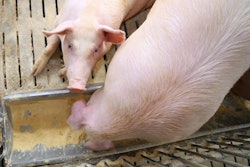
After the news, Cambodia tightened controls over the import of live pigs, and Taiwan raised the penalties for illegal pork imports.
The first occurrence of African swine fever (ASF) has been officially reported in Thailand.
Testing positive in November were three pigs in the Bangkok metropolitan area, according to the World Organisation for Animal Health (OIE). The notification was submitted by the national veterinary authority to the OIE in mid-January.
The pigs’ owner purchased the animals as pets in February and August 2021, the report notes. In November, there were the first signs of disease, and all the animals died during the first week of December last year.
While investigations into these cases continue, authorities have traced the source of ASF-infected pork from Thailand found in China. According to the Department of Livestock Development, the meat originated in Nakhon Pathom, reported Bangkok Post. This province is located to the northwest of Bangkok. One out of more than 300 samples taken recently at a slaughterhouse in the area has tested positive for the ASF virus.
In Thailand, local reports allege that pig herds have been decimated by ASF over recent weeks, according to Reuters. Last week, Thailand’s government approved payments to owners whose pigs were culled to prevent the spread of ASF and other viral diseases. Recipients will be around 5,000 smallholders in 56 provinces, who are set to receive a share of THB574 million (US$17.3 million) for 159,000 pigs culled between March and October 2021.
Together with the coronavirus (COVID-19) pandemic and rising feed prices, measures to prevent ASF are blamed for a 30% reduction in Thailand’s pork supply. Bloomberg Quint reported that consumers and fast food chains there have switched to chicken as pork prices have doubled in a year.
Cambodia, Taiwan restrict imports
Last week, Cambodia suspended imports of pigs from Thailand due to the ASF outbreak there, reported Khmer Times. Previously, animals arriving from Thailand and Vietnam were subject to veterinary inspection, but now incoming trade has been temporarily halted. Registered importers will require import certificates and animals will be checked.
At the peak of the trade, 8,000-9,000 pigs from Thailand and Vietnam entered Cambodia daily. While a recent expansion in domestic production has reduced this reliance on imports, Cambodia’s authorities are reported to be monitoring pig meat supplies to ensure local demand is met.
After news of the ASF cases in Thailand, Taiwan introduced fines for anyone bringing Thai pig meat into its territory. The minimum penalty will be TWD200,000 (US$7,250), reports Focus Taiwan. For repeated offenses, this could rise to TWD1 million. Anyone unable to pay the fine immediately will face deportation, as will any migrant workers found to be bringing in pork products illegally.
Ahead of the Lunar New Year, checks are being stepped up for pig products at Taiwanese borders and also for traders and sellers, according to Taiwan News.
In 2021, more than twice as many packages of illegal pork were intercepted by the authorities than in the previous 12 months. The Council of Agriculture has reminded residents not to place online orders for these meat products from other countries as they may carry the ASF virus. In the week prior to the holiday, inspectors will visit up to 500 shops thought to be selling imported meat.
During December, Taiwan reported detecting the ASF virus in a package of sausages sent from Thailand.
Overview of the ASF situation in Asia, Oceania: 2020-21
In its latest assessment of the global ASF situation, dated January 6, OIE reports it has been notified of 1,039 reported outbreaks among domestic pigs in Asia since January 2020.
Just over 89,000 individual cases have been confirmed, while losses of pigs stand at 398,247. This figure covers animals at infected premises, but does not include those culled in areas surrounding outbreaks.
In addition, 1,625 cases in wild boar have been reported across the continent over this period.
From Oceania over the two years, OIE has been notified of four ASF outbreaks. Directly involved were 397 domestic pigs, and 500 cases of the disease.
ASF situation in Russia’s Urals and Far East
This month, ASF was detected in a backyard herd in the Khabarovsk region in the Far Eastern federal district. Of the 70 pigs in the herd, 27 showed symptoms, and two died.
This brings to 19 the number of outbreaks in this region since July 2021. As well as three cases in wild boar, a total of 645 domestic pigs have been directly involved.
Also located in the Far East district is Primorsky. In this region, the authorities have officially declared to the OIE that a previous outbreak wave ended on December 28. In mid-November, two infected wild boar were found at one location.
Furthermore, the Russian veterinary authority has declared “resolved” the ASF situation in the Khanty-Mansi autonomous region. Located in the Urals federal district, this was the site of a single outbreak during November. Described as a “backyard,” the affected premises had 410 pigs. Of these, the majority died and 90 were culled to prevent further spread of the infection.
ASF detected in another Malaysian state
In Malaysia, local media report pigs in Sarawak testing positive for the ASF virus. All the pigs belonging to the three infected backyard herds are to be culled.
According to Malay Mail, the affected premises are near Sibu. This city is in the central region of Sarawak, a state in Eastern Malaysia. While increasing surveillance and monitoring of pigs in the state, and movements of pigs and pork to and from other parts of the country have been suspended. Authorities are urging local people neither to hunt wild boar, nor visit pig farms.
Sarawak borders Sabah state, where ASF was first detected during February 2021. These two states are located on the island of Borneo. In December 2021, infections were reported for the first time in Western Malaysia.
Update from other Asian countries
The number of ASF-infected wild boar in South Korea has risen to 1,906, as of January 6. According to the United Nations’ Food and Agriculture Organization (FAO), first cases have been identified in the Wonju and Donghae counties of Gangwon province, as well as further cases in Gyeonggi and North Chungcheong.
Meanwhile, Indonesia’s agriculture ministry has now confirmed ASF in six regions and one city in the province of Western Kalimantan, reports FAO.
Kalimantan is the Indonesian territory on Borneo. Across the region, FAO and the animal health directorate have organized training sessions on ASF and disease response procedures for local veterinarians.
On Sumatra — an island in Western Indonesia — new ASF cases have been reported. According to the FAO, these include wild boar in West Sumatra, and domestic pigs in the provinces of Lampung and Riau Islands.
The Philippines continues to report new cases of ASF, albeit at a much slower pace than previously. Currently, focus of the outbreaks is in North Cotabato, a province in the Soccsksargen region in the south of Mindanao.
ASF virus has been detected in three more villages, according to the Philippine News Agency. These bring to eight the number of villages affected in the province. More than 2,000 pigs belonging to 430 owners have been culled already. These were located within 500 meters of a confirmed outbreak. Around 40 communities have been warned to be alert for signs of the disease.
View our continuing coverage of the global African swine fever situation.

















